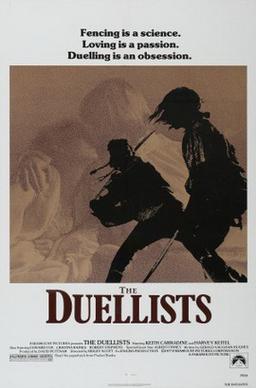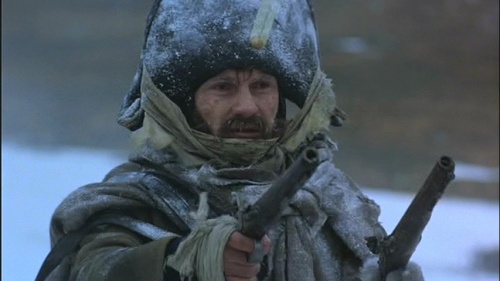En
garde! “The Duellists” was director
Ridley Scott’s (“Black Hawk Down”) feature film debut. He started strong as the movie won the Best
Debut Film award at Cannes. Scott was
tired of doing commercials and had to actively pursue the project. He was given a budget of under $1 million and
a choice of four actors for the leads.
He chose Keith Carradine and Harvey Keitel. Keitel was available after Coppola dumped
him from “Apocalypse Now”. Carradine
almost became unavailable due to his surprise #1 hit “I’m Easy”. The
movie was based on Joseph Conrad’s novella “The Duel” which itself
was based on two French officers who conducted a series of duels over decades.
The
movie opens in Strasbourg in 1800. A
French Hussar named Feraud (Keitel) skewers the mayor’s nephew in a duel. The French general sends a staff officer
named d’Hubert (Carradine) to inform Feraud that he is confined to
quarters. He catches Feraud at the wrong
time and place which causes Feraud to challenge him to a duel. Hey, don’t stab the messenger! The movies second duel in ten minutes ends
with d’Hubert victorious and thinking that’s the last time he will have to
interact with this mad man. “He is most
unreasonable” will turn out to be the understatement of the Napoleonic
War. Speaking of unreasonable, when he
returns to headquarters the general is upset with him. It is unclear why –
must be some French thing.
Six
months later the two meet up in Augsberg.
Their second duel features d’Hubert calling time out to sneeze. It ends unsatisfactorily. The third is down and dirty with heavy
sabers. The fourth is in Lubeck in 1806. This one is on horseback and is a joust
equivalent of a duel. Tres cool. d’Hubert manages to stay out of Feraud’s path
for the next six years until they are both in the detritus of the retreat from
Moscow. Even though they are freezing,
duel #5 is on until interrupted by Cossacks.
Spoil sports! After the exile of
Napoleon, d’Hubert retires to a country estate and weds. End of story, right? Wrong.
There are still some unresolved issues as far as Feraud is
concerned. Plus we in the audience
demand closure!
This
is a very interesting movie. And why
wouldn’t it be when it is based on such an insane story. Conrad based his novella on the real life
adventures of two French officers named Dupont and Fournier. The series of 30 duels over nineteen years
began in 1794 under similar circumstances to what is shown in the movie. The last one also ended similar to in the
movie. Scott takes the fascinating story
and adds excellent attention to detail.
The sets are authentic to the time period and are reminiscent of “Barry
Lyndon”. The uniforms and weapons are
spot on for the Napoleonic army. And we see a variety of weapons in the
dueling scenes. They are all authentic
and in some cases quite valuable. When
Keitel insisted on tossing his last dueling pistol, Scott had to make sure it
landed on a mattress. Scott is careful
not to be repetitive in the duels. Most
importantly, although you won’t learn much about the Napoleonic Wars from this
movie (with the exception of the Moscow retreat scene which will have you
cuddling under a blanket), you will be steeped in the minutiae of dueling
etiquette. For instance, years pass by
because d’Hubert has been promoted above Feraud and only equal ranks could
duel.
I’m not
sure if Scott was shooting for the big takeaway that their concept of honor was
ridiculous, but the movie seems to push that idea. Feraud is border line insane and d’Hubert may
be worse because he realizes how insane things are, but risks his deserved
happiness on these points of honor. The
duels are used as a metaphor for war. By
the end of the movie, Feraud can not even remember what started the feud.
The movie
is essentially a two character affair. Feraud
is one of the great war movie villains and Keitel inhabits the part. You get the distinct impression that he must
have been an ass during the filming.
Carradine does some of his best work in a weaker part. d’Hubert is too good to be true. He has no flaws. Although an extremely likeable character, the
movie could have used a little less holiness.
This comes to an unrealistic head when d’Hubert prevents the execution
of the man he most despises. He also
unnecessarily risks his future happiness to fight the last duel. This does fit the age-old trope that military
men will chose their profession over family.
If
you like duels, this movie is for you.
It has quantity and quality. It
also has two fascinating characters and a story that flows from start to
finish. It is definitely one of the 100
best war movies ever made.
THE NOVELLA
Don’t read this if you have not watched the movie. The movie parallels the novella
admirably. The story does not open with
the duel between Feraud and the mayor’s son.
The initial meeting between the two protagonists is from the story. d’Hubert’s reaming by the general comes after
their second duel. He is understanding
of the situation, but still forbids d’Hubert to duel any more. The second duel, which is brief in the movie,
lasts a bit longer in the story. The
third and fourth duels are very similar to the ones in the story. In the story, the encounter during the retreat
from Moscow occurred when both men were cut off from their unit and had to open
fire on some Cossacks. They had not been
planning to duel. The climactic duel is
much more complicated in the short story.
They start on opposite ends of the forest. d’Hubert deliberately exposes himself to a
long shot which misses. He lies on the
ground pretending to be hit. When Feraud
comes up he surprises d’Hubert who leaps up, but Feraud misses with his last
shot. d’Hubert refuses to kill him. He returns to his fiancé Adele who is
waiting, thus proving she loves him.
Later, d’Hubert writes a letter of reconciliation, but Feraud remains an
ass.
GRADES:
Movie = A-
Novella = B+



I really liked the movie when I watched it a few years ago. It made my best of list of that year. I still haven't read the book though, so I skimmed your review, since I've got ot here and really want to read it.
ReplyDeleteThe movie is such a great character study and both actors are excellent.
I agree - this is one of my favourite movies, and one of Scott's best. The man should be forced to work on a tight budget again... Some years ago, I bought a few DVDs cheap, and have presented them to friends I know appreciate fine period movies.
ReplyDeleteGood point about the tight budget. However, he did not stay in that budget range long as his next movie was "Alien"!
ReplyDeleteYeah, another classic (I was 14 when I saw it; watched it last year and it still holds up). No, I meant the bloated epics he's doing now. Has he done anything good post-Gladiator?
ReplyDeleteBlack Hawk Down. That's about it.
ReplyDeleteKeitel is as mad as a cut snake in this film. However I wouldn't say Carradine has the weaker character. He does a great job in making Keitel look like an even bigger pain in the arse - if that is possible.
ReplyDeleteOkay, I'll go along with that. Thanks for the cool simile.
Delete